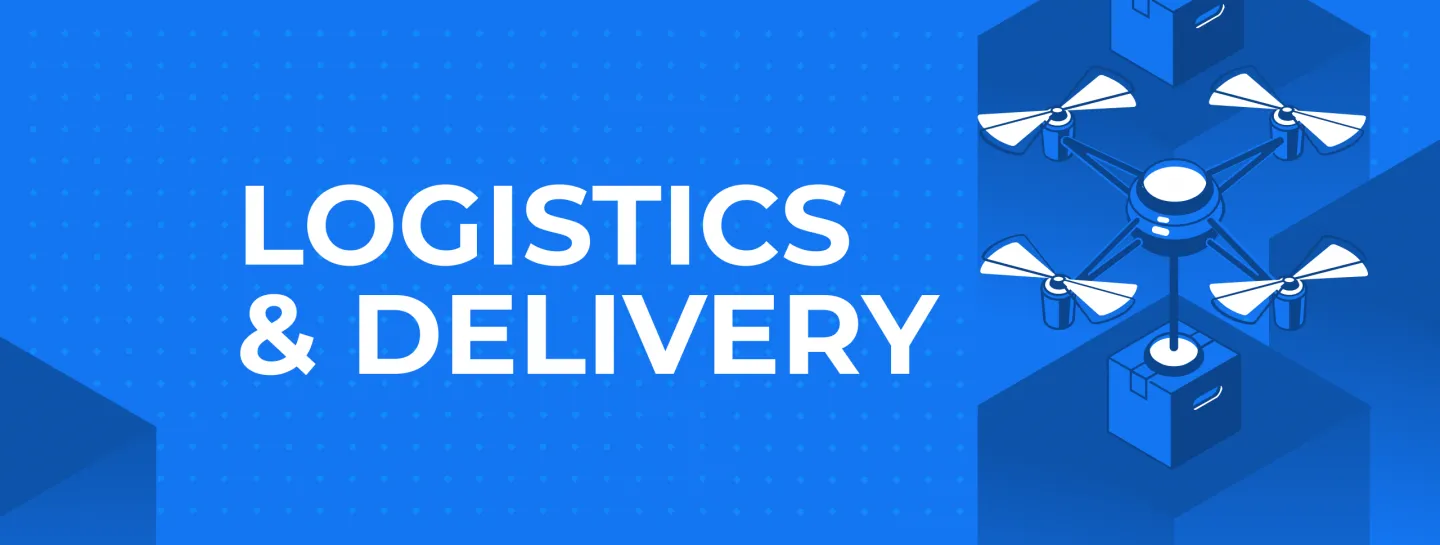
Tech Trends in Transportation and Logistics

The ancient Silk Roads once spanned the globe, weaving intricate networks of trade and commerce across vast distances. Today, the landscape of logistics reflects a new era, where collaboration with robots, drones, and artificial intelligence (AI) reshapes the industry. Instant transactions traverse the globe effortlessly, and a wave of digital natives floods the market, demanding seamless logistics solutions. To remain competitive in this dynamic environment, continuous upskilling and adaptation are essential.
In the fast-evolving realm of transport and logistics, software development emerges as a driving force behind efficiency gains, operational optimization, and elevated customer experiences. As we step into 2024, a host of emerging trends in software development are poised to redefine industry standards and revolutionize logistics management:
1. Augmented Reality (AR) in Warehousing:
Augmented reality (AR) has emerged as a transformative technology in the logistics sector, particularly in warehouse operations. By overlaying digital information onto real-world environments, AR applications enhance the capabilities of warehouse personnel, streamline processes, and improve operational efficiency.
Applications of AR in Warehousing:
- Picking and Packing: AR-enabled smart glasses or mobile devices provide warehouse workers with real-time visual cues, guiding them to the location of items to be picked. This minimizes errors, reduces picking time, and enhances overall productivity.
- Inventory Management: AR technology allows warehouse staff to visualize inventory levels and product information by simply pointing their device at shelves or storage bins. This facilitates accurate inventory counts, simplifies stock replenishment, and reduces the likelihood of stockouts.
- Training and Onboarding: AR-based training modules immerse new hires in interactive simulations of warehouse operations, allowing them to familiarize themselves with equipment, workflows, and safety procedures in a virtual environment.
Benefits of AR in Warehousing:
- Improved Accuracy: AR-guided picking and packing processes minimize errors and discrepancies, leading to higher order accuracy rates and improved customer satisfaction.
- Enhanced Productivity: By providing real-time visual instructions and eliminating the need for paper-based documentation, AR streamlines warehouse operations and increases throughput.
- Reduced Training Time: AR-based training modules enable faster onboarding of new employees by providing interactive, hands-on learning experiences that simulate real-world scenarios.
Case Study: DHL's Implementation of AR:
DHL, a global leader in logistics, has implemented AR technology in its warehouse operations to improve order picking efficiency. By equipping warehouse workers with smart glasses equipped with AR capabilities, DHL has achieved significant productivity gains and cost savings. Workers wearing AR glasses receive visual prompts indicating the location of items to be picked, leading to a 25% increase in picking efficiency.
Future Outlook:
In 2024 and beyond, the adoption of AR technology in warehousing is expected to accelerate, driven by advancements in wearable devices, augmented reality software, and the growing demand for operational efficiency in logistics. As AR solutions become more affordable and accessible, smaller logistics companies may also embrace this technology to remain competitive in the market.
2. Predictive Analytics for Supply Chain Optimization:
Predictive analytics has become indispensable in supply chain management, enabling organizations to anticipate demand fluctuations, mitigate risks, and optimize inventory levels. By harnessing the power of advanced algorithms and vast datasets, predictive analytics tools provide valuable insights that drive proactive decision-making and enhance supply chain resilience.
Key Applications of Predictive Analytics:
- Demand Forecasting: Predictive analytics models analyze historical sales data, market trends, and external factors (e.g., weather patterns, economic indicators) to forecast future demand with greater accuracy. This enables organizations to optimize inventory levels, reduce stockouts, and minimize excess inventory holding costs.
- Inventory Optimization: Predictive analytics algorithms help organizations optimize their inventory levels by identifying slow-moving items, detecting patterns of demand variability, and recommending replenishment strategies. By maintaining the right balance of inventory, companies can improve customer service levels while minimizing carrying costs.
- Supply Chain Risk Management: Predictive analytics enables organizations to identify and mitigate potential risks in the supply chain, such as supplier disruptions, transportation delays, or geopolitical events. By proactively addressing these risks, companies can enhance supply chain resilience and minimize the impact of disruptions on their operations.
Benefits of Predictive Analytics:
- Improved Forecast Accuracy: Predictive analytics models leverage advanced statistical techniques and machine learning algorithms to generate more accurate demand forecasts, reducing forecasting errors and enhancing supply chain visibility.
- Cost Savings: By optimizing inventory levels, minimizing stockouts, and reducing the need for expedited shipments, predictive analytics can help organizations lower their overall logistics costs and improve profitability.
- Enhanced Customer Satisfaction: By ensuring product availability, reducing order lead times, and proactively addressing supply chain disruptions, predictive analytics contributes to higher customer satisfaction levels and increased loyalty.
Case Study: Amazon's Use of Predictive Analytics:
Amazon, the world's largest online retailer, relies heavily on predictive analytics to manage its vast network of warehouses, optimize inventory levels, and forecast customer demand. By analyzing historical sales data, browsing patterns, and other relevant variables, Amazon's predictive analytics algorithms can accurately predict future demand for millions of products, enabling the company to maintain high service levels while minimizing inventory holding costs.
Future Outlook:
In the years ahead, predictive analytics will continue to play a central role in supply chain optimization, driven by advances in data analytics, machine learning, and artificial intelligence. As companies strive to become more agile and resilient in the face of uncertainty, predictive analytics will be essential for adapting to changing market conditions, minimizing risks, and maximizing opportunities.
3. Blockchain for Supply Chain Transparency:
Blockchain technology has gained traction in the logistics industry as a means to enhance transparency, traceability, and security within supply chains. By leveraging decentralized ledger technology, blockchain enables immutable record-keeping and transparent transactional histories, fostering trust and integrity across the supply chain.
Key Applications of Blockchain in Supply Chain:
- Traceability: Blockchain provides a tamper-proof record of the journey of products from their point of origin to their final destination. By recording every transaction and transfer of ownership on the blockchain, companies can trace the provenance of goods and verify their authenticity, reducing the risk of counterfeiting and ensuring compliance with regulations.
- Supply Chain Visibility: Blockchain enables real-time visibility into the movement of goods across the supply chain, allowing stakeholders to track the status and location of shipments at every stage of the journey. This enhances transparency, improves coordination between supply chain partners, and enables faster response to disruptions or delays.
- Smart Contracts: Blockchain-based smart contracts automate and enforce agreements between parties involved in supply chain transactions, such as suppliers, manufacturers, distributors, and customers. Smart contracts execute predefined actions automatically when specified conditions are met, streamlining processes, reducing paperwork, and minimizing the risk of disputes.
Benefits of Blockchain:
- Increased Transparency: Blockchain provides a single source of truth for all stakeholders in the supply chain, ensuring transparency, accountability, and trust. By eliminating discrepancies and disputes, blockchain enhances collaboration and fosters stronger relationships between trading partners.
- Improved Security: Blockchain's cryptographic algorithms and decentralized architecture make it highly resistant to tampering, fraud, and cyberattacks. By storing data in an immutable ledger distributed across multiple nodes, blockchain enhances the security and integrity of supply chain transactions.
- Enhanced Efficiency: Blockchain streamlines supply chain processes by automating manual tasks, reducing paperwork, and eliminating intermediaries. By digitizing and decentralizing record-keeping, blockchain improves efficiency, reduces costs, and accelerates the pace of business transactions.
Case Study: Walmart's Use of Blockchain:
Walmart, one of the world's largest retailers, has implemented blockchain technology to enhance the traceability of food products in its supply chain. By partnering with IBM and other technology providers, Walmart has developed a blockchain-based system that enables real-time tracking of food shipments from farm to store. This allows Walmart to quickly trace the source of any foodborne illnesses or product recalls, ensuring the safety and quality of its products.
Future Outlook:
In the coming years, blockchain technology will continue to transform the logistics industry, driving transparency, efficiency, and trust across supply chains. As blockchain platforms mature and adoption increases, we can expect to see greater interoperability between different blockchain networks, enabling seamless data exchange and collaboration between supply chain partners.
4. Internet of Things (IoT) Integration:
The Internet of Things (IoT) is revolutionizing logistics management by enabling real-time tracking and monitoring of assets, vehicles, and shipments. IoT sensors and devices provide valuable data on environmental conditions, vehicle performance, and asset location, allowing organizations to optimize routes, improve fleet efficiency, and ensure timely delivery.
Key Applications of IoT in Logistics:
- Asset Tracking: IoT sensors embedded in shipping containers, pallets, and packages enable real-time tracking of goods throughout the supply chain. By monitoring the location and condition of assets, organizations can reduce the risk of loss, theft, or damage, and improve inventory management.
- Fleet Management: IoT devices installed in vehicles, such as trucks, ships, and drones, provide real-time data on fuel consumption, engine performance, and driver behavior. This enables fleet managers to optimize routes, reduce fuel costs, and enhance driver safety, leading to greater operational efficiency.
- Cold Chain Monitoring: IoT sensors equipped with temperature, humidity, and light sensors enable real-time monitoring of perishable goods during transportation and storage. By maintaining optimal conditions throughout the cold chain, organizations can prevent spoilage, reduce waste, and ensure product quality and safety.
Benefits of IoT Integration:
- Enhanced Visibility: IoT provides real-time visibility into the location, status, and condition of assets and shipments across the supply chain. By collecting and analyzing data from IoT devices, organizations can make informed decisions, respond quickly to disruptions, and optimize their operations.
- Improved Efficiency: IoT enables organizations to automate manual tasks, optimize routes, and streamline processes, leading to greater operational efficiency and cost savings. By leveraging IoT data, organizations can identify inefficiencies, reduce idle time, and improve resource allocation.
- Greater Customer Satisfaction: IoT enables organizations to offer real-time tracking and monitoring services to customers, providing visibility and transparency into the status of their shipments. By meeting customer expectations for timely delivery and reliable service, organizations can enhance customer satisfaction and loyalty.
Case Study: Maersk's Use of IoT:
Maersk, the world's largest container shipping company, has deployed IoT sensors on its containers to monitor temperature, humidity, and other environmental conditions during transit. By leveraging IoT data, Maersk can ensure the integrity of temperature-sensitive cargo, such as pharmaceuticals and perishable goods, and provide customers with real-time visibility into the status of their shipments.
Future Outlook:
In the years ahead, IoT integration will continue to transform the logistics industry, driving greater visibility, efficiency, and responsiveness across supply chains. As the cost of IoT devices decreases and connectivity improves, we can expect to see broader adoption of IoT solutions among logistics providers, leading to more interconnected and intelligent supply chains.
Conclusion
As we advance into 2024, these software development trends promise to revolutionize the transport and logistics industry. By embracing emerging technologies and innovative software solutions, logistics enterprises can maintain a competitive edge, driving operational efficiency and elevating customer satisfaction in an increasingly competitive marketplace.





